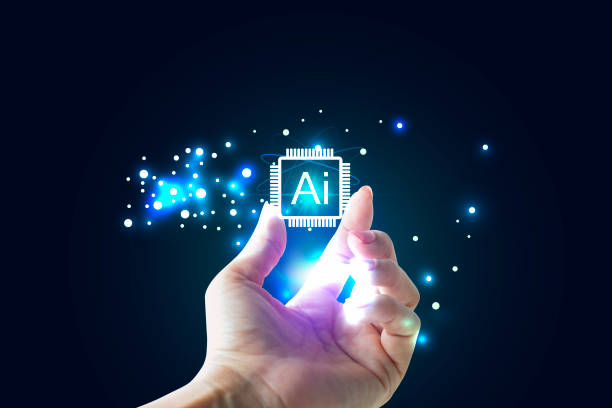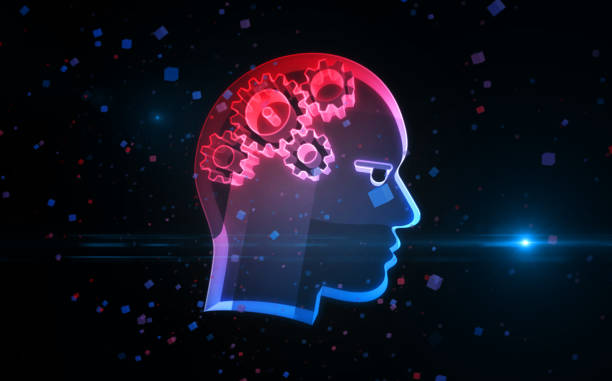What is Artificial Intelligence? Key Definitions and Concepts

What is Artificial Intelligence? Key Definitions and Concepts
#Artificial_Intelligence (AI) refers to the ability of a computer system to mimic human cognitive functions such as learning, reasoning, and problem-solving.
This multidisciplinary field encompasses computer science, mathematics, statistics, and neuroscience.
The main goal of AI is to create machines that can perform tasks that currently require human intelligence.
Some key concepts in AI include Machine Learning (Machine Learning), Artificial Neural Networks (Artificial Neural Network), Natural Language Processing (Natural Language Processing), and Computer Vision.
Machine learning allows systems to learn from data without being explicitly programmed.
Artificial neural networks are models inspired by the structure of the human brain and are used for pattern recognition and prediction.
Natural language processing enables machines to understand and generate human language.
Computer vision enables machines to understand and interpret images and videos.
AI is rapidly advancing and has diverse applications in various industries.
Did you know that your company’s website is the first point of contact for 75% of potential customers?
Your website is the face of your brand. With **Rasaweb’s** corporate website design services, build an online presence that earns customer trust.
✅ Create a professional and lasting image of your brand
✅ Attract target customers and increase online credibility
⚡ Get a free consultation from **Rasaweb** experts!
History and Evolution of Artificial Intelligence

History and Evolution of Artificial Intelligence
The history of artificial intelligence dates back to the 1950s when scientists and researchers began exploring the possibility of creating machines with human-like intelligence.
Alan Turing (Alan Turing) was one of the pioneers in this field and proposed the Turing test, which is a measure for evaluating machine intelligence.
In the 1960s, significant advances were made in the field of symbolic reasoning and problem-solving.
Programs like ELIZA and SHRDLU were able to conduct simple conversations with humans.
However, in the 1970s, due to hardware limitations and lack of data, the progress of AI slowed down, a period known as the “AI winter.”
In the 1980s, AI regained attention with the emergence of expert systems.
Expert systems were programs that modeled specialized knowledge in a specific domain and could assist experts in decision-making.
In the 1990s and 2000s, with the increase in computing power and access to more data, machine learning developed rapidly.
Algorithms such as deep neural networks and support vector machines (SVMs) achieved remarkable results in fields such as image recognition and natural language processing.
Today, AI is transforming and its applications are expanding.
Types of Artificial Intelligence Based on Capabilities

Types of Artificial Intelligence Based on Capabilities
AI can be divided into several categories based on its capabilities.
Narrow AI, or Weak AI, is a type of AI designed to perform a specific task.
Most of today’s AI systems are of this type, such as virtual assistants like Siri and Alexa and recommendation systems.
General AI, or Strong AI, is a type of AI that can perform any task that a human is capable of.
This type of AI is still in the early stages of development and has not been fully realized.
Super AI is a type of AI that surpasses human intelligence.
This type of AI is still hypothetical and there are concerns about its potential risks.
In addition, AI can be divided based on the learning method into supervised learning, unsupervised learning, and reinforcement learning.
Supervised learning involves training a model using labeled data.
Unsupervised learning involves discovering patterns in unlabeled data.
Reinforcement learning involves training an agent to perform a task by receiving feedback in the form of reward or punishment.
| Type of AI | Capabilities | Examples |
|---|---|---|
| Narrow AI | Performing a specific task | Virtual Assistants, Recommendation Systems |
| General AI | Performing any task a human can | Not fully realized yet |
| Super AI | Surpassing human intelligence | Still hypothetical |
Applications of Artificial Intelligence in Various Industries

Applications of Artificial Intelligence in Various Industries
AI has numerous applications in various industries.
In the healthcare industry, AI can be used for diagnosing diseases, developing drugs, and providing personalized care.
In the financial industry, AI can be used for fraud detection, risk management, and providing customer service.
In the transportation industry, AI can be used for autonomous driving, route optimization, and improving safety.
In the retail industry, AI can be used for personalized recommendations, inventory management, and improving customer experience.
In the manufacturing industry, AI can be used for process automation, quality control, and predicting failures.
These are just a few examples of the applications of AI in various industries.
With the advancement of technology, the applications of AI are constantly expanding.
Are you disappointed with the low conversion rate of your online store?
Rasaweb is your definitive solution with professional e-commerce website design!
✅ Increase your sales and revenue
✅ Unparalleled user experience for your customers
⚡ Get a free consultation now!
Machine Learning and its Role in Artificial Intelligence

Machine Learning and its Role in Artificial Intelligence
Machine learning (Machine Learning) is one of the main branches of AI that allows systems to learn from data without being explicitly programmed.
Machine learning algorithms can identify patterns in data and use these patterns to make predictions or decisions.
There are different types of machine learning algorithms, including supervised learning, unsupervised learning, and reinforcement learning.
Supervised learning involves training a model using labeled data.
Unsupervised learning involves discovering patterns in unlabeled data.
Reinforcement learning involves training an agent to perform a task by receiving feedback in the form of reward or punishment.
Machine learning plays an important role in the development of AI systems.
Without machine learning, many AI applications such as image recognition, natural language processing, and autonomous driving would be impossible.
Artificial Neural Networks and Deep Learning

Artificial Neural Networks and Deep Learning
Artificial neural networks (Artificial Neural Network) are models inspired by the structure of the human brain and are used for pattern recognition and prediction.
An artificial neural network consists of a number of nodes (neurons) that are organized in layers.
Each node receives an input, processes it, and produces an output.
The output of one node is used as input for other nodes in subsequent layers.
Deep learning is a subset of machine learning that uses deep neural networks (neural networks with multiple layers) to solve complex problems.
Deep learning has achieved remarkable results in areas such as image recognition, natural language processing, and speech recognition.
Deep learning algorithms can learn complex features from data and use these features to make predictions or decisions.
Challenges and Limitations of Artificial Intelligence

Challenges and Limitations of Artificial Intelligence
Despite significant advances, AI still faces challenges and limitations.
One of the main challenges of AI is the need for large and high-quality data to train models.
Machine learning models often require vast amounts of data to accurately identify patterns.
Another challenge is the interpretability of AI models.
Many deep learning models act like black boxes, and it is difficult to understand how a model arrived at a particular decision.
This can be problematic in areas such as healthcare and law where transparency and accountability are important.
In addition, AI faces ethical concerns.
The use of AI can lead to discrimination, job loss, and privacy violations.
Therefore, the development and use of AI must be done with consideration of ethical and social issues.
| Challenge | Description |
|---|---|
| Need for large and high-quality data | Machine learning models often require vast amounts of data |
| Interpretability of models | It is difficult to understand how a model arrived at a particular decision |
| Ethical concerns | The use of AI can lead to discrimination, job loss, and privacy violations |
The Future of Artificial Intelligence and its Impact on Society

The Future of Artificial Intelligence and its Impact on Society
The future of artificial intelligence looks very bright.
With the advancement of technology, AI is expected to advance in various fields and find more applications.
AI can have a profound impact on society.
AI can help improve productivity, reduce costs, and create new opportunities.
However, AI can also create challenges, such as job loss and increased inequality.
Therefore, it is important that AI is developed responsibly and with consideration of its social impacts.
AI can transform human lives in the near future.
Did you know that 94% of users’ first impressions of a business are related to its website design? With a professional corporate website design by **Rasaweb**, turn this first impression into an opportunity for growth.
✅ Attract more customers and increase sales
✅ Create credibility and trust in the eyes of the audience⚡ Get a free website design consultation!
Tools and Programming Languages Used in Artificial Intelligence

Tools and Programming Languages Used in Artificial Intelligence
Various tools and programming languages are used to develop AI systems.
Python is one of the most popular programming languages in the field of AI.
Python has powerful libraries such as TensorFlow, PyTorch, and Scikit-learn that are used for machine learning and deep learning.
R is also a popular programming language for statistics and data analysis and is used in the field of AI.
In addition, tools such as MATLAB, Java, and C++ are also used to develop AI systems.
The choice of the right tool and programming language depends on the type of project and its specific needs.
Key Tips for Entering the World of Artificial Intelligence

Key Tips for Entering the World of Artificial Intelligence
If you are interested in entering the world of artificial intelligence, there are a few key tips to keep in mind.
First, you need to strengthen your foundations in mathematics and statistics.
Knowledge of mathematics and statistics is essential for understanding machine learning algorithms and analyzing data.
Second, you need to learn a programming language like Python.
Python is one of the most popular programming languages in the field of AI and has powerful libraries for machine learning and deep learning.
Third, you need to learn key concepts of AI such as machine learning, artificial neural networks, and natural language processing.
Fourth, you need to do practical projects to strengthen your skills.
Doing practical projects helps you put theoretical concepts into practice and gain experience.
Fifth, you need to be constantly learning.
AI is a rapidly changing field, and to succeed in this field, you need to be constantly learning and updating your knowledge.
AI can improve life.
Frequently Asked Questions
| Question | Answer |
|---|---|
| What is the definition of Artificial Intelligence (AI)? | It is a field in computer science that aims to create intelligent machines that can think, learn, solve problems, and make decisions like humans. |
| Mention some common AI applications. | They include self-driving cars, voice assistants (such as Siri and Alexa), recommendation systems (such as Netflix and Amazon), facial recognition, and medical diagnosis. |
| What is the difference between Narrow AI (ANI) and General AI (AGI)? | Narrow AI specializes in a single, specific task, while General AI possesses human intellectual ability to perform any cognitive task. |
| What is Machine Learning (ML) and its relationship to AI? | Machine learning is a branch of AI that focuses on developing algorithms that allow systems to learn from data without explicit programming. |
| What are Artificial Neural Networks (ANNs)? | They are computational models inspired by the structure and function of the human brain, used in deep learning to process data and discover complex patterns. |
| Mention some ethical challenges related to AI. | They include issues of privacy, bias in data and algorithms, job loss, and liability in the event of errors or unfair decisions. |
| What is Natural Language Processing (NLP)? | It is a branch of AI that focuses on enabling computers to understand, interpret, and generate human language in a useful and interactive way. |
| How can AI affect the labor market? | It can lead to the automation of some routine tasks, requiring the retraining of workers and the creation of new jobs in the areas of design, development, and maintenance of AI systems. |
| What is Computer Vision? | It is a field in AI that enables computers to “see,” understand, and interpret images and videos in the same way that humans do, enabling them to recognize objects and faces. |
| What is the importance of data in developing AI systems? | Data is the fuel that feeds AI systems, especially in machine learning. The quality and quantity of data significantly affect the accuracy and performance of models and their ability to learn and make correct decisions. |
And other advertising agency services Rasa Web in the field of advertising
Smart UI/UX: A fast and efficient solution to attract customers by focusing on attractive user interface design.
Smart Sales Automation: Designed for businesses looking to analyze customer behavior through an SEO-driven content strategy.
Smart Conversion Rate Optimization: A dedicated service to increase website visits based on custom programming.
Smart Website Development: An effective tool for online growth with the help of marketing automation.
Smart Linking: Designed for businesses looking to increase sales through precise audience targeting.
And over a hundred other services in the field of Internet advertising, advertising consulting and organizational solutions
Internet Advertising | Advertising Strategy | Advertorial
Resources
What is analytical artificial intelligence and what are its applications?
,What is artificial intelligence and what are its applications?
,What is artificial intelligence and what are its applications?
,What is artificial intelligence and what are its applications?
? In order for your business to shine in the digital world and achieve its lofty goals, Rasaweb Afrin Digital Marketing Agency is by your side with its expertise and experience. We pave your way to growth by providing comprehensive digital marketing solutions, including website design with a modern user interface, SEO, online advertising and social media management.
📍 Tehran, Mirdamad Street, next to the Central Bank, South Kazerun Alley, Ramin Alley No. 6




